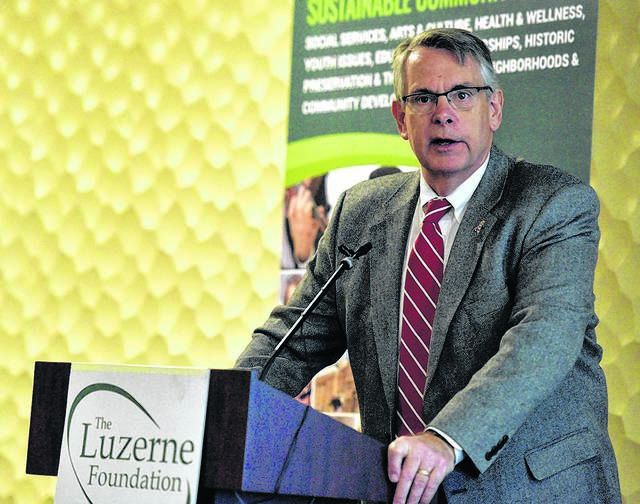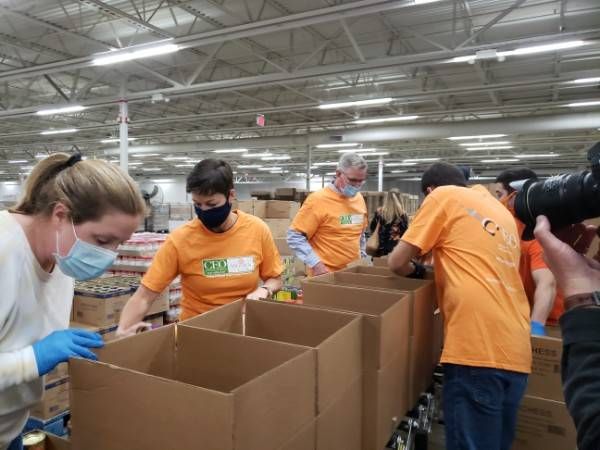Statewide survey reveals billions in lost revenue and extra costs for groups that help others
Click here to subscribe today or Login.
The COVID-19 pandemic has hit most sectors of the U.S. economy hard, and nonprofits are no exception.
A new statewide survey of about 800 organizations across Pennsylvania shows just how bad the damage has been: Hundreds of millions in direct costs just to that tiny sample, which balloons into the billions when the total sector is taken into consideration.
The survey, conducted by the national community and economic development firm Fourth Economy and coordinated through a partnership of The Pittsburgh Foundation, its affiliate, The Community Foundation of Westmoreland County, The Forbes Funds, the Pennsylvania Association of Nonprofit Organizations (PANO) and the United Way of Southwestern Pennsylvania, is the most comprehensive data gathered about the economic impact of COVID on the nonprofit sector to date, organizers say.
The study reports revenue losses of $612 million and new operating expenses of $95.3 million, for a total of $708 million. Based on the data collected from 808 nonprofits — 2% of the state’s total — the actual economic toll to organizations ranging from child care centers to arts organizations balloons to billions of dollars.
Pennsylvania’s nonprofits employ more than 15% of the state’s workforce and generate almost $132 billion in revenue annual revenues, the study’s authors noted.
Luzerne County impacts
An online dashboard shows the impact at the statewide, regional and county levels. According to the dashboard, 22 Luzerne County nonprofits who responded to the survey reported:
• A net financial loss of $2.345 million when lost revenues ($2.285 million) and added COVID-related expenses ($336,650) were taken into account.
• Seventeen people laid off or furloughed, 23 people whose pay was reduced and a further 81 jobs at risk.
“Needless to say, virtually every nonprofit has been affected,” said Charles Barber, president and CEO of The Luzerne Foundation, a Wilkes-Barre-based philanthropic group that has long supported the nonprofit sector.
Back in March, as the pandemic was just gaining a foothold and Pennsylvania entered a state-mandated shutdown, the foundation launched an emergency response fund to assist nonprofits and other community-based groups.
The study’s findings — and the pain Barber sees locally — reflect not just the hit to revenue and expenses sustained by nonprofits, but the spiraling needs of those organizations as more and more people in the communities they serve find themselves in need of help.
“You have literally thousands of people who have never been on welfare before” who are now seeking government and nonprofit assistance, Barber said.
One of the local groups that has seen the impact firsthand has been the Commission on Economic Opportunity and its Weinberg Food Bank, “certainly one hero of Northeastern Pennsylvania in its work of continuing to provide food to people,” Barber said.
According to its website, CEO has been running a COVID emergency food-packing site to meet those needs, which continue to grow.
“It’s not over,” Barber said.
Other key statewide statistics from the report include:
• Nine out of 10 nonprofits reported some negative employment impacts.
• Nonprofits estimate that 25% of the employees will experience layoffs or pay reductions by the end of the year.
• 23% report increased demand for services.
• 36% report more clients.
• 37% report reduced or suspended services.
• 48% report fewer clients.
• 45% report event cancelations or delays.
Human services impacts
In another critical statistic, 290 human services organizations participated in the survey, representing 19% of respondents, a Pittsburgh Foundation release about the study stated.
That sub-sector reported increased costs of $64 million and revenue decreases of $255 million, figures that represent the financial impact on just 7% of total human services deliverers in Pennsylvania, officials noted.
“Our state’s human services safety net relies heavily upon this part of the nonprofit sector to function and to provide essential needs through assistance programs, including child care, community public health, food provision, career training, protection from domestic violence, and helping people manage various disabilities,” said Lisa Schroeder, president and CEO of The Pittsburgh Foundation, which funded and organized the coalition.
“The increase in vulnerability for those nonprofits alone is significant, but the survey findings on the nonprofit sector overall should sound four alarms about the threat to the state’s economy and general quality of life,” Schroeder added. “It is our hope that these findings are a call to arms for dedicated COVID relief to support the sector. Our ability to recover from this pandemic is very much dependent on the ability of nonprofits to continue their missions.”
A growing trend
The survey ran from Aug. 3 to 28 and results were analyzed by Fourth Economy, officials said, with coalition partners providing guidance and encouraging nonprofits across the state to respond.
But it was only the latest indication of a problem that began as the pandemic ratcheted up its hold on the state.
A survey earlier this year by United Way of Pennsylvania found that 77% of Pennsylvania households have savings to cover one month or less of household expenses. That means many will turn to the nonprofit sector for assistance, as Barber noted locally.
“That means millions of Pennsylvanians are turning to human service agencies, which are then faced with increased costs and reduced funding to meet this crushing need,” said Bobbi Watt Geer, president and CEO of the United Way of Southwestern Pennsylvania. “This new survey gives us a clear window into the challenges that lie ahead. It is essential to understand the scope of the strain on nonprofits, particularly the human services system, so that we can develop appropriate policies and support for agencies that will help us recover from the pandemic.”
Small nonprofits hit hard
According to the survey, small nonprofits faced the most significant impacts.
Those with budgets under $100,000 reported average revenue losses and increased expenses of -47%, or nearly half their budgets, as compared to -26% for mid-size nonprofits with budgets from $501,000 to $2.5 million.
By comparison, the largest nonprofits, those with budgets over $10 million, reported average losses and increased expenses of -7%, still significant but much more manageable for larger organizations which are better equipped to manage the economic impact of the pandemic than their smaller counterparts, the coalition added.
PANO Executive Director Anne L. Gingerich predicted the trends could mean dire consequences for the economy as a whole.
“If nonprofits close, more individuals will look to government as their safety net, raising costs for all of us. We must have more nonprofit-designated funding, distributed as efficiently as possible,” said Gingerich, “and we need innovative collaboration among nonprofits, businesses and government.”
Legislative aid sought
As a release from the coalition pointed out, the survey supports a broader statewide coalition effort to have legislators pass bills that will dedicate a portion of the state’s allotment of $1.3 billion in CARES Act funding to the nonprofit sector: Senate Bill 1254 and House Bill 2740.
The nonprofit sector previously was included with for-profit business for funding through federal programs under the federal Coronavirus Aid, Relief, and Economic Security Act (CARES). But the study team said they found that at least $35 million in operating costs reported are not eligible for CARES Act funding.
They said the proposed legislation would establish the NEEDS (Nonprofit Economic Emergency Delivery System) Grants Program to provide funding to Pennsylvania’s statewide network of 8,500 human services nonprofits that are key determiners of basic quality of life in communities.
Understanding the bigger picture is just beginning, The Pittsburgh Foundation’s Schroeder added, calling the study’s results “a convincing and well-documented first-look at the degree of harm inflicted on nonprofits through the public health and economic crises brought on by COVID.”
“While this is a preliminary study, it makes a powerful case for a more in-depth investigation, so that we understand the points of greatest stress in the sector,” Schroeder said.






